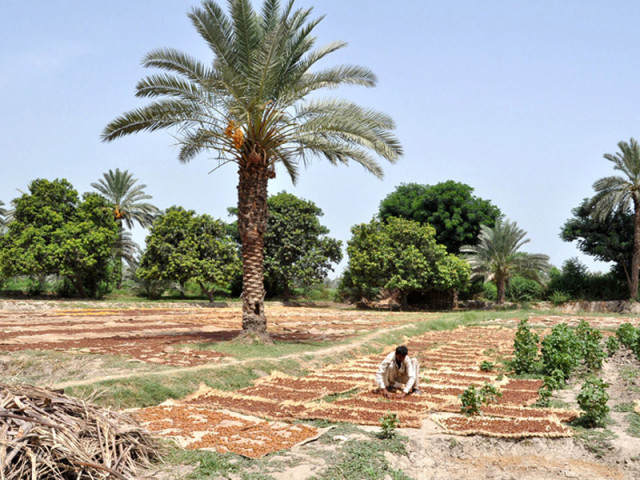Farmers urge govt to cultivate organic dates in Nara desert
Seek investment for high-value organic date farming to rival Gulf countries in quality, exports

Following the success of Kinnow (Mandarin), dates are the only other fruit that earn significant foreign exchange for Pakistan. Progressive farmers are now appealing to the government to promote the cultivation of organic date palms using the 99% abandoned desert area in Nara Tehsil of Khairpur district, near the India border. The region's hot weather, similar to that of Gulf countries, is ideal for growing a variety of both exotic and indigenous date species organically.
Farmers pointed out that organic dates are in high demand both internationally and in affluent domestic markets, where health-conscious consumers prefer organic produce. These farmers, already skilled in producing indigenous manure, believe that applying organic manure to date palms can yield superior dates without the need for inorganic fertilisers and pesticides. The difference in prices between organic and inorganic fruits in the international market can be more than threefold. Pakistan's commercial attachés abroad could explore additional markets for these premium organic dates.
Nara's weather conditionscharacterised by low humidity, significant temperature variation between day and night, and minimal monsoon rains during the July to September date seasonmake it particularly suited for date palm cultivation compared to other Tehsils in the Khairpur district.
Dates from countries like Saudi Arabia, Egypt, and Palestine are globally popular, selling quickly. Pakistan, with its high temperatures in the interior of Sindh, is fully capable of producing similar varieties in all four sizes: jumbo, premium, medium, and small. Date palms typically take five to six years to bear fruit.
Cultivating exotic dates in Nara Tehsil's desert will promote these varieties in a climate similar to that of Gulf countries. The Indian government is already implementing such practices and providing extensive support to its farmers to boost fruit exports, while Pakistan's policymakers appear less motivated or inactive.
Ghulam Qasim Jiskani, a veteran progressive date palm farmer from Khairpur, stated, "We urge the government to invest in this long-neglected date palm sector, ensure more research and development (R&D), and scale up production and exports in the coming years. The government should provide state-of-the-art facilities such as cold storage, packaging, processing, and marketing, and support net covering of fruit to protect it from dust and birds."
He added that offering long-term interest-free loans, supplying adequate water to the desert area, and providing other incentives would encourage farmers to cultivate the barren desert land, thereby increasing foreign exchange through the export of dates, which hold economic, religious, and cultural significance in Pakistan.
Agriculturalist Dr Mushtaq Soomro remarked, "After Kinnow, dates are the only fruit that earn foreign exchange. Why is this industry being neglected when it has so much potential?"
He explained that fresh dates are in higher demand globally compared to Chowhara (dry dates), but proper cold storage facilities could extend the shelf life of fresh dates. The byproducts of dates include date powder, sweets, biscuits, bread, syrup, sauce, vinegar, liquor, coffee, and more.
Furthermore, Khairpur is the largest district in Sindh in terms of both area and population. Jaisalmer district in Rajasthan, India, which borders Nara Tehsil in Khairpur district, has seen significant government support for date cultivation. The Indian government has provided free cultivable land, date saplings, water supply, and R&D facilities, along with maximum incentives to farmers in this desert region. This effort is aimed at promoting exotic date varieties in a climate that mirrors the conditions of Gulf countries, where dates are globally renowned.



















COMMENTS
Comments are moderated and generally will be posted if they are on-topic and not abusive.
For more information, please see our Comments FAQ